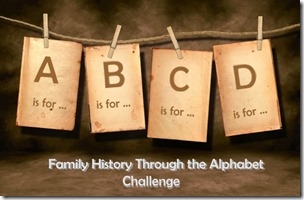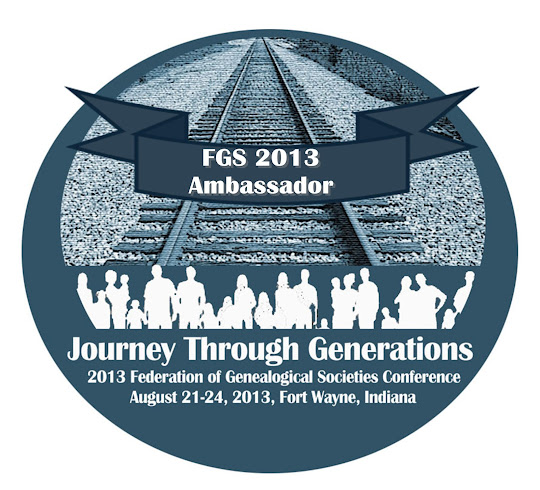
For 26 weeks I will take you on a family history journey through the alphabet, one letter at a time. I have decided that each post will be educational in nature, focusing on topics related to resources, methodology, tools, etc. Although the challenge is complete, there are still some people who are finishing up and Alona, the host, is encouraging others to participate anyway. Additional information on the challenge, can be found at Take the ‘Family History Through the Alphabet’ Challenge.

Last month I posted about message boards and mailing lists. Now that we’ve gotten to the letter Q, it’s time to talk about using those tools by developing effective queries.
Since message boards and mailing lists offer the opportunity to post a good amount of information, it’s much easier to craft an effective query in these mediums than in a publication where queries are often limited due to space restrictions. In other words, TAKE ADVANTAGE of this opportunity and offer as much detail as possible in order to ensure your query is read and hopefully you’ll get some helpful responses.
The Query
I hate to say it, but there are some really terrible queries out there. How do you respond to something like the following, posted to the Smith surname board on Ancestry?
Title: John Smith
Looking for John Smith died between 1880 and 1900, probably in Morgan County, Illinois.
*Okay, this is factitious and may be a little extreme, but I have seen queries of this broad and undefined nature before.
Chances are, you might not respond; heck, you may not even read the query since the title gives no indication of place, time period, or anything other than a very common name. The query is not any better than the title. Sure it gives a timeframe and a place, but do you know how many John Smith’s died in Morgan county between 1880 and 1900? (At least four.)
Not only that, but when I see the range 1880-1900, I think, “missing 1890 census” and “20-year gap.” Did John Smith really die, or did the researcher simply lose track of him in that 20-year span and jump to a premature conclusion? Who knows. There just isn’t enough information in the query to work with.
So how do you craft an effective query when you don’t know much about the person your are inquiring about? Good question. In my opinion, provide as much information as you can about the person in question as well as those you DO know about, like a spouse, parent, sibling, or child.
Here’s an example. I don’t know much about my third great- grandmother, Mary Ryan, but I do know a little bit about her children, which may help to identify her among the many Irish Mary Ryans out there. The following is what I would post:
Title: Mary RYAN Millett (County Kilkenny, Ireland; b. abt. 1842, d. 1912)
Trying to learn more about Mary RYAN, born about 1842 and died in County Kilkenny, Ireland in 1912. I’m particularly interested in finding out when and where she was born, as well as who her parents and siblings are. Here’s what I know about Mary so far:
- She married John MILLETT on 20 February 1860 in County Kilkenny.
- Mary and John were enumerated in the 1901 and 1911 censuses, residing in Stroan, Kilfane Parish, County Kilkenny .
- Mary and John had at least seven children as follows:
- Margareth (1863-1945; removed to the United States and eventually settled in Aurora, Kane, Illinois; married Thomas CAHILL, also from County Kilkenny)
- Michael (1865-??; living in New York in 1945)
- Mary (1867-??)
- Robert (1872-??; living with parents in County Kilkenny in 1901 and 1911)
- Ellen (1874-??; married a ROBERTSON; living in Boston, Massachusetts in 1945)
- Anne (1878-??; may have died in 1902; living with parents in County Kilkenny in 1901)
- Catherine (1882-??; married John POWERS; living in County Kilkenny in 1945)
For additional details about the Ryan/Millett family, you can refer to my blog post Surname Saturday – Ryan (County Kilkenny) at http://genblogjulie.blogspot.com/2013/05/surname-saturday-ryan-county-kilkenny.html.
Additional info on Mary’s children would also be much appreciated!
Willing to share information about Mary’s daughter Margareth.
See how I used what I knew about both Mary and her children? If I simply stated only what I knew about Mary herself, it wouldn't have been much to go off. The post is still relatively short, but it gives enough relevant information to provide a good picture of the family I am looking for. Additionally, providing the information about her children shows where my gaps are that perhaps someone can fill in.
You’ll also notice that I stated a purpose—what I was hoping to learn about Mary. While everything under the sun would be great, first and foremost, I specifically want to know when/where born and who her parents/siblings are. And, secondarily, if anyone has additional information on Mary’s children, I’d be interested in filling those gaps as well.
Titles / Subject Lines
Titles should be specific to the person you are looking for. A name and some other identifier(s), such as location(s) or date(s) will help people determine if they need to read your query. We are all stretched for time and when we follow message boards or receive emails from mailing lists, we want to be able to go through them quickly and determine if we recognize something that we can help with. In the John Smith example I used earlier, that message would probably be skipped by many. If, however, it said “John Smith, b. 1808 in New London, Connecticut” or “John Smith, son of Josiah, b. 1808 in Connecticut” that might ring a bell with someone and they would proceed to open the message and see what the query is and if they are able to assist. Of course the query itself would have to be crafted well too!
Additional Tips
Following are a few additional ideas to consider when using message boards and mailing lists and crafting your query.
- Take a look at various message boards for inspiration. Just by looking at titles/subjects and the queries themselves, you can get an idea of what works and what doesn’t.
- Please, please, please, write your query as if you were writing a business letter or email. Use proper grammar, capitalization, and punctuation, etc. It is so frustrating to read a huge run-on sentence with no punctuation, misspelled words, etc. If you want to be taken seriously, please follow this advice!
- If you have a tree online, share a link direct to the person you are inquiring about so that others can see any additional information you may have as well as the family structure. Alternatively, if you have a detailed blog post, research article, biographical sketch, or narrative available online about the person and/or other family member(s) mentioned in the query, provide a link to those as well (you’ll notice I did this in my example).
- Post to multiple message board and mailing list providers. And don’t forget to post to both the surname (including alternate spellings) and locality boards. For instance, I may choose to post my Mary Ryan query on Ancestry’s message board, under both the Ryan surname and the County Kilkenny boards, as well as the Ryan surname and County Kilkenny mailing lists at RootsWeb, and the Ryan surname board at GenForum. I’d even flip the query to focus on Mary’s husband John, and post to the Millett, Millet, Milott, Mylott, etc. surname boards through the various providers. I wouldn’t have to post again to the County Kilkenny boards because I include both Mary’s maiden and married names in the title of the query.
- When you learn more about a person you’ve previously posted a query about, add a “reply” to the original message with the new information.
A Final Thought
Granted, message boards can be used for other things besides looking for a specific individual or family. You may have a question about records in a particular location (e.g., what’s available, where a certain record set it located, what sources do people recommend, etc.). You could have questions about the history of or an event that took place in a specific location. You might hope to find someone willing to do a lookup for you, or even inquire about genealogists for hire in a place that you are unable to travel to. The same “rules” for titles and queries apply. Be specific and provide enough information so that people can actually help you.



















1 comment:
Lots of great advice here for posting queries Julie, thanks.
Post a Comment